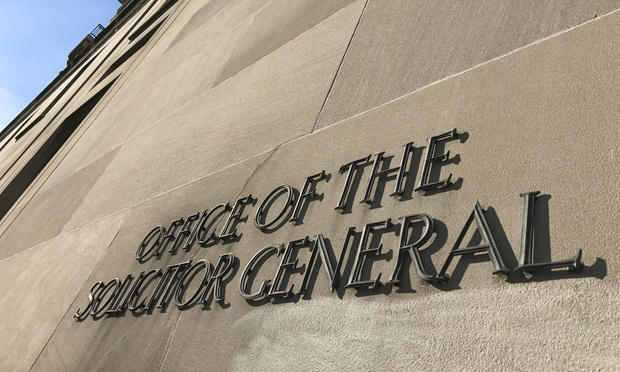Seven Cases to Watch at the Supreme Court's First Conference in New Year
Justices are weighing disputes over the lawfulness of the SEC's administrative law judges; online sales taxes; an ethics clash between Main Justice and the ACLU; and Arizona's death penalty.
January 02, 2018 at 02:50 PM
6 minute read
 U.S. solicitor general's office at Main Justice. Credit: Mike Scarcella/ ALM
U.S. solicitor general's office at Main Justice. Credit: Mike Scarcella/ ALM The U.S. Supreme Court enters its first conference meeting of 2018 with a list of heavyweight petitions ranging from constitutional attacks on administrative law judges at the U.S. Securities and Exchange Commission, an ethics fight between the U.S. solicitor general and the ACLU, and Arizona's death penalty.
Traditionally, mid-January marks the time the justices finish adding cases for argument during the current term. At the end of 2017, only nine cases were awaiting argument dates. That leaves considerable room for the justices to fill the March and April argument calendars.
Here's a look at seven cases scheduled for the Jan. 5 conference that might garner those necessary four votes to grant review.
The lawfulness of the SEC's in-house judge scheme is questioned.
Back in November, U.S. Solicitor General Noel Francisco said the Trump administration would no longer defend a federal appeals court decision that said administrative law judges at the Securities and Exchange Commission were “employees” and not “officers” subject to U.S. Constitution's appointments clause. The SEC then moved immediately to “ratify” the appointments of its five in-house judges.
Francisco urged the court to grant review in Lucia v. SEC to resolve the status of the ALJs, an issue that has split the lower federal appeals court. He also suggested that the justices appoint on outside lawyer to defend the decision by the U.S. Court of Appeals for the D.C. Circuit. Mark Perry of Gibson, Dunn & Crutcher represents investment adviser Raymond J. Lucia. Another case, from the Tenth Circuit, is also on the docket. That dispute, SEC v. Bandimere, poses a possible recusal from Justice Neil Gorsuch.
The SG's office wants the court to sanction the ACLU.
The Trump administration lost a court fight over a pregnant immigrant teen's request to have an abortion in Garza v. Hargan when the D.C. Circuit, in a per curiam opinion, upheld a lower court order allowing the teen's abortion. Solicitor General Francisco subsequently filed a high court petition seeking to vacate that decision and urging the justices to impose sanctions on the teen's ACLU lawyers for alleged unethical conduct in misleading the government about when the abortion would be performed. Both sides have filed briefs in Hargan v. Garza and non-record materials with the high court. Sidley Austin's Carter Phillips represents the ACLU, which has denied the charges.
Should online retailers have to pay state-based sales taxes?
South Dakota Attorney General Marty Jackley asks the Supreme Court to overturn the “physical presence” requirement that prevents states from requiring out-of-state retailers to remit taxes for sales made within the state. The physical presence requirement comes from the justices' 1992 decision in Quill v. North Dakota.
South Dakota's law adopts an “economic presence” test. It requires a seller who does not have a physical presence in the state to remit sales tax if the seller, in the prior or current year, meets either of two, alternative criteria: (a) the seller's gross revenue from sales delivered into South Dakota exceeds $100,000; or (b) the seller made sales for delivery into South Dakota in 200 or more separate transactions.
South Dakota and a number of other states are hoping to attract Justice Anthony Kennedy's vote for review. Kennedy, in a 2015 case, said the high court should re-evaluate Quill and its predecessor, National Bellas Hess v. Illinois Department of Revenue “in view of the dramatic technological and social changes that had taken place in our increasingly interconnected economy.” Nearly two dozen amicus briefs have been filed in the case South Dakota v. Wayfair.
Will the court take Breyer's call to re-examine the death penalty?
Hogan Lovells partner Neal Katyal may be hoping at least four justices are ready to accept Justice Stephen Breyer's repeated invitation to the court to reopen the debate over the constitutionality of the death penalty. Katyal attacks Arizona's capital sentencing scheme and then launches a broadside against the death penalty as cruel and unusual punishment in Hidalgo v. Arizona. “Together with more than 20 retired judges and prosecutors experienced with Arizona's capital system, I have urged the high court to take Hidalgo v. Arizona to eradicate arbitrariness and overbreadth from the death penalty system,” Rudy Gerber wrote recently in a National Law Journal op-ed.
A patent owner seeks lost profit from outside the U.S.
Ah, what would a conference list be without at least one patent case seeking to overturn the Federal Circuit? Kirkland & Ellis partner Paul Clement asks the high court in WesternGeco v. ION Geophysical whether a patentee who has proven a domestic act of infringement may recover lost profits it would have earned outside of the United States if the infringement had not occurred.
A jury found that ION had infringed six different claims from WesternGeco's four patents and awarded $12.5 million in royalties. The jury also awarded $93.4 million in lost profits. The Federal Circuit imposed a per se bar against recovering lost foreign profits. Clement got a boost from the U.S. solicitor general, who urged the justices to grant review.
California's gun regulations are on the docket.
Fallout from the justices' 2008 landmark Second Amendment decision continues to reach a high court reluctant to step back into the gun regulation arena. Silvester v. Becerra, according to its supporters, is a narrow constitutional challenge. The petition contends California's application of a full, 10-day waiting period to gun purchasers who already own a firearm and who clear a background check in fewer than 10 days is an “arbitrary and irrational burden” on their Second Amendment rights. The issue for the justices is what type of scrutiny courts should apply to gun regulations. D.C.'s Erik S. Jaffe is counsel to Jeff Silvester and two gun rights organizations.
On climate change and seals.
Alaska and the Alaska Oil and Gas Association, with support from the U.S. Chamber of Commerce and others, challenge the federal government's listing of the bearded seal—presently not endangered—as endangered because the species “will lose its habitat due to climate change by the end of the century.” The Trump administration opposes high court review.
This content has been archived. It is available through our partners, LexisNexis® and Bloomberg Law.
To view this content, please continue to their sites.
Not a Lexis Subscriber?
Subscribe Now
Not a Bloomberg Law Subscriber?
Subscribe Now
NOT FOR REPRINT
© 2025 ALM Global, LLC, All Rights Reserved. Request academic re-use from www.copyright.com. All other uses, submit a request to [email protected]. For more information visit Asset & Logo Licensing.
You Might Like
View All
‘Diminishing Returns’: Is the Superstar Supreme Court Lawyer Overvalued?

DC Lawsuits Seek to Prevent Mass Firings and Public Naming of FBI Agents
3 minute read
Trending Stories
Who Got The Work
J. Brugh Lower of Gibbons has entered an appearance for industrial equipment supplier Devco Corporation in a pending trademark infringement lawsuit. The suit, accusing the defendant of selling knock-off Graco products, was filed Dec. 18 in New Jersey District Court by Rivkin Radler on behalf of Graco Inc. and Graco Minnesota. The case, assigned to U.S. District Judge Zahid N. Quraishi, is 3:24-cv-11294, Graco Inc. et al v. Devco Corporation.
Who Got The Work
Rebecca Maller-Stein and Kent A. Yalowitz of Arnold & Porter Kaye Scholer have entered their appearances for Hanaco Venture Capital and its executives, Lior Prosor and David Frankel, in a pending securities lawsuit. The action, filed on Dec. 24 in New York Southern District Court by Zell, Aron & Co. on behalf of Goldeneye Advisors, accuses the defendants of negligently and fraudulently managing the plaintiff's $1 million investment. The case, assigned to U.S. District Judge Vernon S. Broderick, is 1:24-cv-09918, Goldeneye Advisors, LLC v. Hanaco Venture Capital, Ltd. et al.
Who Got The Work
Attorneys from A&O Shearman has stepped in as defense counsel for Toronto-Dominion Bank and other defendants in a pending securities class action. The suit, filed Dec. 11 in New York Southern District Court by Bleichmar Fonti & Auld, accuses the defendants of concealing the bank's 'pervasive' deficiencies in regards to its compliance with the Bank Secrecy Act and the quality of its anti-money laundering controls. The case, assigned to U.S. District Judge Arun Subramanian, is 1:24-cv-09445, Gonzalez v. The Toronto-Dominion Bank et al.
Who Got The Work
Crown Castle International, a Pennsylvania company providing shared communications infrastructure, has turned to Luke D. Wolf of Gordon Rees Scully Mansukhani to fend off a pending breach-of-contract lawsuit. The court action, filed Nov. 25 in Michigan Eastern District Court by Hooper Hathaway PC on behalf of The Town Residences LLC, accuses Crown Castle of failing to transfer approximately $30,000 in utility payments from T-Mobile in breach of a roof-top lease and assignment agreement. The case, assigned to U.S. District Judge Susan K. Declercq, is 2:24-cv-13131, The Town Residences LLC v. T-Mobile US, Inc. et al.
Who Got The Work
Wilfred P. Coronato and Daniel M. Schwartz of McCarter & English have stepped in as defense counsel to Electrolux Home Products Inc. in a pending product liability lawsuit. The court action, filed Nov. 26 in New York Eastern District Court by Poulos Lopiccolo PC and Nagel Rice LLP on behalf of David Stern, alleges that the defendant's refrigerators’ drawers and shelving repeatedly break and fall apart within months after purchase. The case, assigned to U.S. District Judge Joan M. Azrack, is 2:24-cv-08204, Stern v. Electrolux Home Products, Inc.
Featured Firms
Law Offices of Gary Martin Hays & Associates, P.C.
(470) 294-1674
Law Offices of Mark E. Salomone
(857) 444-6468
Smith & Hassler
(713) 739-1250









